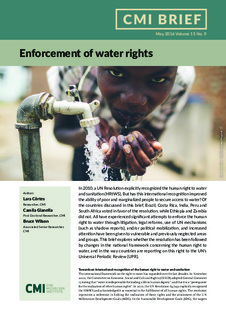Enforcement of water rights
Report
Permanent lenke
http://hdl.handle.net/11250/2475335Utgivelsesdato
2016-05-01Metadata
Vis full innførselSamlinger
- Publications [1488]
Originalversjon
Bergen: Chr. Michelsen Institute (CMI Brief vol. 15 no. 9) 4 p.Sammendrag
In 2010, a UN Resolution explicitly recognized the human right to water and sanitation (HRtWS). But has this international recognition improved the ability of poor and marginalized people to secure access to water? Of the countries discussed in this brief, Brazil, Costa Rica, India, Peru and South Africa voted in favor of the resolution, while Ethiopia and Zambia did not. All have experienced significant attempts to enforce the human right to water through litigation, legal reforms, use of UN mechanisms (such as shadow reports), and/or political mobilization, and increased attention have been given to vulnerable and previously neglected areas and groups. This brief explores whether the resolution has been followed by changes in the national framework concerning the human right to water, and in the way countries are reporting on this right to the UN’s Universal Periodic Review (UPR).
Photo from flickr: USAID/Morgana Wingard
Towards an international recognition of the human right to water and sanitation The international framework on the right to water has expanded over the last decades. In November 2002, the Committee on Economic, Social and Cultural Rights (CESCR) adopted General Comment 15 stating that "water is indispensable for leading a life in human dignity", and that it is a "prerequisite for the realization of other human rights". In 2010, the UN Resolution 64/292 explicitly recognized the HRtWS and acknowledged it as essential to the fulfillment of all human rights. The resolution represents a milestone in linking the realization of these rights and the attainment of the UN Millennium Development Goals (MDG). In the Sustainable Development Goals (SDG), the targets related to access to water and sanitation are broad and involve, among other things, the reduction of pollution, and the protection and restoration of water-related ecosystems. The impact of the international recognition of the HRtWS depends, among other
